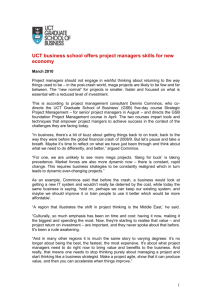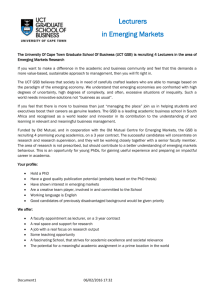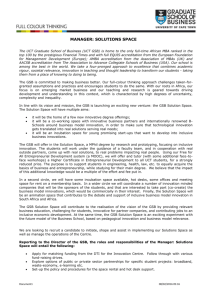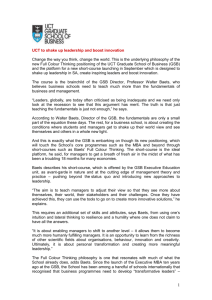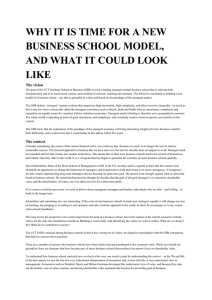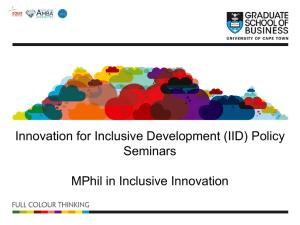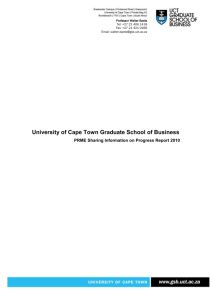Basic function and purpose of the Job
advertisement
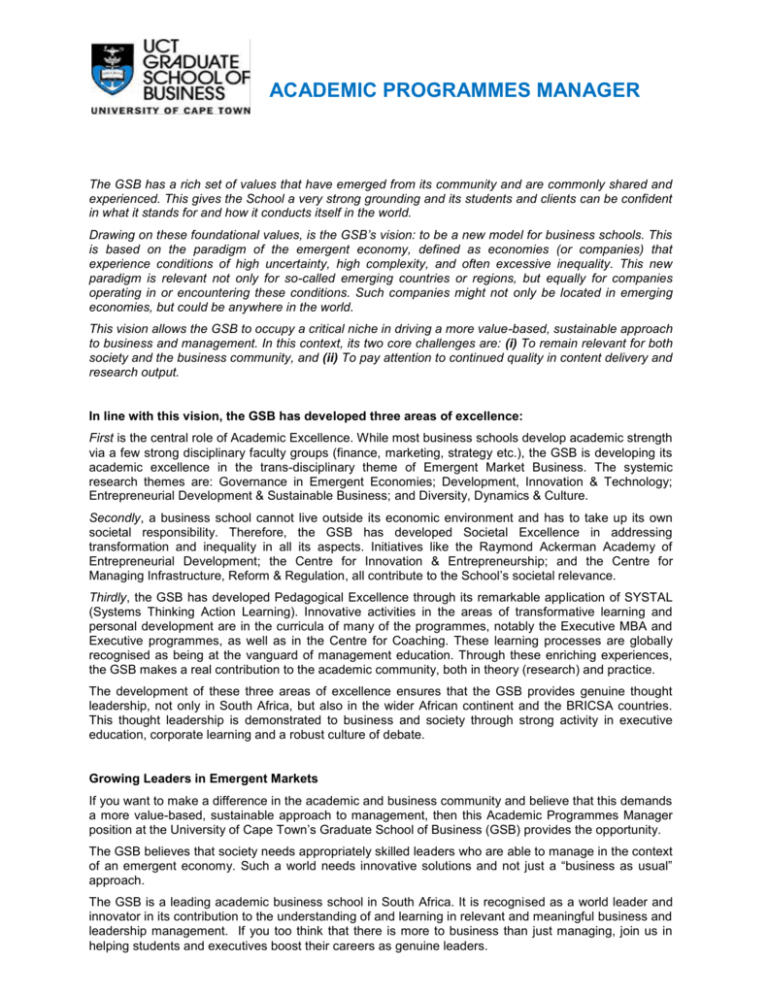
ACADEMIC PROGRAMMES MANAGER The GSB has a rich set of values that have emerged from its community and are commonly shared and experienced. This gives the School a very strong grounding and its students and clients can be confident in what it stands for and how it conducts itself in the world. Drawing on these foundational values, is the GSB’s vision: to be a new model for business schools. This is based on the paradigm of the emergent economy, defined as economies (or companies) that experience conditions of high uncertainty, high complexity, and often excessive inequality. This new paradigm is relevant not only for so-called emerging countries or regions, but equally for companies operating in or encountering these conditions. Such companies might not only be located in emerging economies, but could be anywhere in the world. This vision allows the GSB to occupy a critical niche in driving a more value-based, sustainable approach to business and management. In this context, its two core challenges are: (i) To remain relevant for both society and the business community, and (ii) To pay attention to continued quality in content delivery and research output. In line with this vision, the GSB has developed three areas of excellence: First is the central role of Academic Excellence. While most business schools develop academic strength via a few strong disciplinary faculty groups (finance, marketing, strategy etc.), the GSB is developing its academic excellence in the trans-disciplinary theme of Emergent Market Business. The systemic research themes are: Governance in Emergent Economies; Development, Innovation & Technology; Entrepreneurial Development & Sustainable Business; and Diversity, Dynamics & Culture. Secondly, a business school cannot live outside its economic environment and has to take up its own societal responsibility. Therefore, the GSB has developed Societal Excellence in addressing transformation and inequality in all its aspects. Initiatives like the Raymond Ackerman Academy of Entrepreneurial Development; the Centre for Innovation & Entrepreneurship; and the Centre for Managing Infrastructure, Reform & Regulation, all contribute to the School’s societal relevance. Thirdly, the GSB has developed Pedagogical Excellence through its remarkable application of SYSTAL (Systems Thinking Action Learning). Innovative activities in the areas of transformative learning and personal development are in the curricula of many of the programmes, notably the Executive MBA and Executive programmes, as well as in the Centre for Coaching. These learning processes are globally recognised as being at the vanguard of management education. Through these enriching experiences, the GSB makes a real contribution to the academic community, both in theory (research) and practice. The development of these three areas of excellence ensures that the GSB provides genuine thought leadership, not only in South Africa, but also in the wider African continent and the BRICSA countries. This thought leadership is demonstrated to business and society through strong activity in executive education, corporate learning and a robust culture of debate. Growing Leaders in Emergent Markets If you want to make a difference in the academic and business community and believe that this demands a more value-based, sustainable approach to management, then this Academic Programmes Manager position at the University of Cape Town’s Graduate School of Business (GSB) provides the opportunity. The GSB believes that society needs appropriately skilled leaders who are able to manage in the context of an emergent economy. Such a world needs innovative solutions and not just a “business as usual” approach. The GSB is a leading academic business school in South Africa. It is recognised as a world leader and innovator in its contribution to the understanding of and learning in relevant and meaningful business and leadership management. If you too think that there is more to business than just managing, join us in helping students and executives boost their careers as genuine leaders. -2Basic function and purpose of the Job: The Academic Programme (AP) Manager has direct line responsibility to the Director: Open Academic Programmes (OAP) and Academic Director. As the co-ordinator of academic administration, the AP Manager is required to provide strategic guidance and administrative support to the Director: Open Academic Programmes (OAP) and the Faculty, in respect of academic policy and academic administrative matters. The AP Manager interacts with staff, students, prospective students, members of the public and external organisations. He/she has a dotted line relationship with the Registrar and the Commerce Faculty Manager with whom regular consultation is essential in order to ensure effective liaison with relevant central administration departments and compliance with University rules and procedures. Main areas of responsibility: Ensuring an adequate database on academic matters which is essential for all accreditations (AMBA, AACSB, EQUIS, etc.) Advice to students on degree rules and administrative matters; referrals Student administrative system and records Examinations, graduation and related matters Planning the annual cycle of courses/programmes Internal liaison, e.g. with academic departments, programme conveners, student advisors, Central Administration and other offices/ departments External liaison, e.g. SAQA, the Department of Education, etc. Provision of information, advice/assistance to the Academic, OAP and Accreditations Directors Preparation and editing of the Faculty Handbook and other publications and reports Staff management and training/performance development. Duties include: Liaising closely with: the Director: Open Academic Programmes; Academic Director; GSB Director; Heads of Divisions and Committee Chairs; the Faculty Finance Manager; and the Central Administration, on all academic administrative and policy decisions affecting the Faculty Co-ordinating staff that are in the function of academic administration Producing a year plan (calendar) for all programmes Planning and administering the registration process at Faculty level, including briefing staff and student advisors, co-ordinating activities, and managing the capture of registration data Managing the administration of the examination and graduation processes at Faculty level, e.g.: working with the Examinations Committee to identify degree qualifiers, prize and scholarship winners, etc.; managing the readmissions (appeals) administrative process; and liaising with the Doctoral Degrees Board Managing the maintenance of manual and electronic record keeping and filing systems (admissions and student administration are supported by an on-line record system). This includes overseeing processing of student concessions and changes of curriculum, updating of examination results, etc. and making any necessary interventions to ensure compliance with policies Providing advice to students, dealing with their queries and helping with the resolution of their problems where appropriate, with referrals to student counsellors for further academic related advice where necessary. Providing information and advice to student counsellors (e.g. interpretation of rules) Administering course fee waivers and processing international postgraduate scholarships Producing reports and publications, as required; and providing student-related statistical information [in so doing, ensuring that the Faculty derives as much information as it can from the Student System to support its work (accreditation)] Managing course information on the student system, including: creation of new courses; changes to existing courses; and input of notional credit values for HEMIS (subsidy) purposes; and liaising with the Faculty Finance Manager on course fee information Developing and maintaining a manual of policies and procedures for academic administration in the Faculty and keeping up to date with developments in the University and changes in Senate 533569420 17/02/2016 11:18 -3- and Council policies Managing the preparation, and editing of the annual Faculty student handbook and editing of the Faculty's entry in the University's Prospectus and the Orientation Week booklet, and other publications Liaising with offices in the Registrar's Department and with other Faculties through membership of the Faculties’ Academic Administration Committee which meets monthly to co-ordinate functions concerning admissions and student administration Liaising with students on all administration procedures Carrying out responsibilities as a Commissioner of Oaths Such other duties which may from time to time be assigned by the Academic Director Taking responsibility for the overall co-ordination of academic activities within the GSB. Job requirements: A Master’s degree in Education or an equivalent qualification Previous experience in a similar position at tertiary education level in managing academic programmes Experience within a business school environment (strongly preferred) This position requires the incumbent to communicate and influence at various levels within the School and effective communication and interpersonal skills are essential This position will operate across academic programmes and divisions within the GSB and the incumbent will need excellent organisational skills, the ability to deal with complex issues in a proactive manner and to be a strong problem-solver Proven experience in efficient and successful database management, as well as software packages for planning and administration. The annual remuneration package, including benefits, will be between R397 308 and R453 388. If you are interested in applying for this position, please follow the application process stated below. Application process: To apply, please e-mail the completed UCT Application form (HR201), including a motivation that speak directly to the requirements of this job and all other relevant documentation as indicated on the form, with the subject line “Academic Programmes Manager”, followed by the reference number to Ms Abigail van Sensie at abigail.vansensie@uct.ac.za Address: Staff Recruitment Office, University of Cape Town, Private Bag X3, Rondebosch, 7700. Telephone: +27 21 650 3003 Faculty website: www.gsb.uct.ac.za The application form can also be downloaded at http://web.uct.ac.za/depts/sapweb/forms/hr201.doc. Please note that the intended date for interviews is 3 May 2013, therefore please indicate your availability to attend an interview on this date in your cover letter. An application which does not comply with the above requirements will be regarded as incomplete. Only shortlisted candidates will be contacted. Reference number for this position: SR477/13 Closing date for applications: 25 April 2013 UCT is committed to the pursuit of excellence, diversity and redress. Our Employment Equity Policy is available at http://www.uct.ac.za/downloads/uct.ac.za/about/policies/eepolicy.pdf 533569420 17/02/2016 11:18
